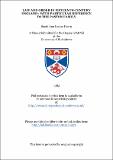Law and order in fifteenth-century England : with particular reference to the Paston family
Abstract
The Pastons were a family of landed gentry living in Norfolk in the fifteenth century. During the years 1422-1470 they rose socially to the highest echelons of their rank, acquiring land and status as they rose. In order to understand the significance of this upward mobility it is necessary to examine the background of the period. Through a discussion of the legal machinery and social structure in the fifteenth century it becomes clear that the Pastons' rise was even more momentous because of the family profession. Involvement with the law was only just beginning to be regarded as acceptable. As the family rose in prominence in Norfolk society we see them adopting the behaviour and prejudices common to the more ancient landed gentry and the nobility. This is evidenced in their self-righteous indignation over persecution by the gangs which terrorized the countryside, and especially in their anger over the unacceptable marriage alliance of one of their daughters. By the time of the latter event, 1467, the Pastons were firmly established as leaders in Norfolk society. But they paid the price of their status almost daily. In 1459 John I inherited large tracts of land from Sir John Fastolf in a will written and signed two days before his death. So great were Paston's powers in this will that bitter animosity arose among the other executors. They and others attempted repeatedly to remove his powers and disseise him. Throughout the 1460's the Paston family's entire concern was to retain their inheritance. The fifteenth century is equated with and has been studied largely because of the skirmishes and battles which occupied the second half of the century. However, this study demonstrates that there was much more to the period than the 'Wars of the Roses'. Using the letters and papers of this stereotype landed-gentry family as the primary source, the succeeding pages attempt to illustrate law and order, not as exercised by a manipulative, dictatorial central administration, but used on the local level to combat disorder on a very narrow scale.
Type
Thesis, MPhil Master of Philosophy
Collections
Items in the St Andrews Research Repository are protected by copyright, with all rights reserved, unless otherwise indicated.

